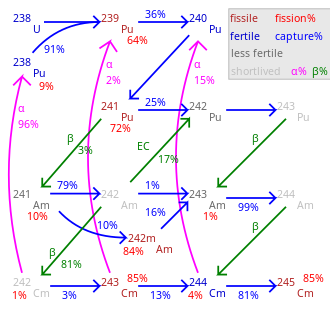Fissile material
Fissile material refers to substances capable of sustaining a nuclear chain reaction with neutrons of any energy level. The most prominent fissile materials are uranium-235 (235U), plutonium-239 (239P), and uranium-233 (233U). These materials are crucial in both nuclear reactors and nuclear weapons, as they can undergo fission when struck by a neutron, releasing a significant amount of energy, more neutrons, and fission products. This article delves into the characteristics, applications, and importance of fissile materials in the nuclear field.
Characteristics
Fissile materials have the unique property of being able to sustain a nuclear chain reaction. When a nucleus of a fissile material absorbs a neutron, it may undergo fission, splitting into two or more smaller nuclei, known as fission products, and releasing a few neutrons along with a large amount of energy. The ability to sustain a chain reaction is determined by several factors, including the material's neutron cross-section, which measures the probability of neutron capture, and the number of neutrons produced per fission event.
Applications
Nuclear Reactors
In nuclear reactors, fissile materials are used as fuel. The controlled nuclear chain reaction generates heat, which is then used to produce steam. This steam drives turbines to generate electricity. The most commonly used fissile material in nuclear reactors is 235U, although 233U and 239P are also used in certain types of reactors.
Nuclear Weapons
Fissile materials are also critical in the design of nuclear weapons. A rapid, uncontrolled chain reaction in a sufficient mass of fissile material (known as a critical mass) can lead to an explosive release of energy. The design of nuclear weapons often involves 239P or 235U.
Safety and Regulation
Handling and storing fissile materials involve significant safety measures to prevent accidental criticality—the condition where a chain reaction becomes self-sustaining and uncontrollable. Regulations and safeguards are in place to prevent the proliferation of fissile materials, given their potential use in nuclear weapons.
Environmental and Health Risks
The use of fissile materials poses environmental and health risks, primarily from the radiation emitted by fission products. Long-term exposure to radiation can lead to health issues, including cancer. The disposal of nuclear waste, which contains fissile materials and their by-products, is a major environmental challenge.
Conclusion
Fissile materials play a critical role in the field of nuclear energy and weaponry. Their unique ability to sustain a nuclear chain reaction makes them invaluable for generating electricity and for national defense. However, the handling, use, and disposal of these materials require stringent safety, health, and environmental precautions to mitigate the associated risks.
Transform your life with W8MD's budget GLP-1 injections from $125.
W8MD offers a medical weight loss program to lose weight in Philadelphia. Our physician-supervised medical weight loss provides:
- Most insurances accepted or discounted self-pay rates. We will obtain insurance prior authorizations if needed.
- Generic GLP1 weight loss injections from $125 for the starting dose.
- Also offer prescription weight loss medications including Phentermine, Qsymia, Diethylpropion, Contrave etc.
NYC weight loss doctor appointments
Start your NYC weight loss journey today at our NYC medical weight loss and Philadelphia medical weight loss clinics.
- Call 718-946-5500 to lose weight in NYC or for medical weight loss in Philadelphia 215-676-2334.
- Tags:NYC medical weight loss, Philadelphia lose weight Zepbound NYC, Budget GLP1 weight loss injections, Wegovy Philadelphia, Wegovy NYC, Philadelphia medical weight loss, Brookly weight loss and Wegovy NYC
|
WikiMD's Wellness Encyclopedia |
| Let Food Be Thy Medicine Medicine Thy Food - Hippocrates |
Medical Disclaimer: WikiMD is not a substitute for professional medical advice. The information on WikiMD is provided as an information resource only, may be incorrect, outdated or misleading, and is not to be used or relied on for any diagnostic or treatment purposes. Please consult your health care provider before making any healthcare decisions or for guidance about a specific medical condition. WikiMD expressly disclaims responsibility, and shall have no liability, for any damages, loss, injury, or liability whatsoever suffered as a result of your reliance on the information contained in this site. By visiting this site you agree to the foregoing terms and conditions, which may from time to time be changed or supplemented by WikiMD. If you do not agree to the foregoing terms and conditions, you should not enter or use this site. See full disclaimer.
Credits:Most images are courtesy of Wikimedia commons, and templates, categories Wikipedia, licensed under CC BY SA or similar.
Contributors: Prab R. Tumpati, MD

